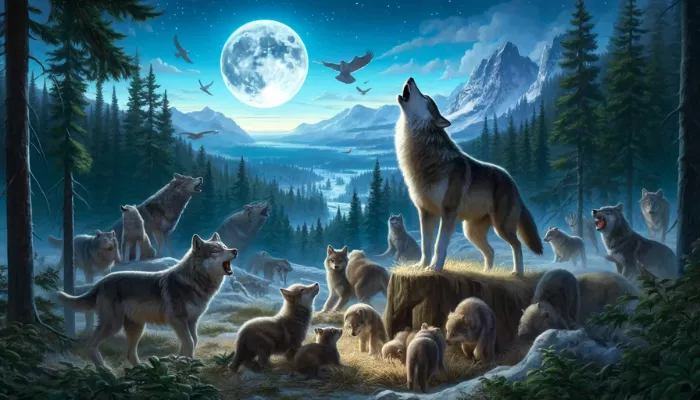Collective nouns are special words used to describe a group of something, making language fun and exciting! Today, let’s explore the fascinating world of wolves and learn about the different collective nouns used to describe them.
Collective Noun for Wolves in Table
| Noun | Collective Noun | Definition | Example |
|---|---|---|---|
| Wolf | Pack | A group of wolves | A pack of wolves howled at the moon. |
| Wolf | Route | A pack on a journey or mission | The route of wolves traveled across the valley. |
| Wolf | Rout | A large group of wolves | A rout of wolves gathered in the forest. |
| Wolf | Litter | A group of wolf pups | The litter of wolf pups played together. |
| Wolf | Troop | A group of wolves | The troop of wolves moved stealthily. |
Detailed Explanations and Examples for Wolves
1. Pack
A pack is a common term used to describe a group of wolves. Wolves are highly social animals that live and hunt in packs, which can range from a few individuals to several dozen.
Examples:
- The pack of wolves worked together to hunt a deer.
- In the wild, a pack of wolves protects its territory fiercely.
- The pack of wolves roamed the snowy landscape in search of food.
2. Route
A route refers to a group of wolves that are on a journey or mission. This term emphasizes their movement and travel as a cohesive unit.
Examples:
- The route of wolves trekked through the mountains.
- Observers tracked the route of wolves across the national park.
- A route of wolves made their way to a new hunting ground.
3. Rout
A rout is a term used to describe a large group of wolves. It can be used when there are many wolves gathered together, often seen during special occasions like seasonal migrations.
Examples:
- A rout of wolves assembled near the riverbank.
- The rout of wolves moved as one massive, synchronized group.
- During winter, a rout of wolves was spotted near the forest edge.
4. Litter
A litter specifically refers to a group of wolf pups born to the same mother at the same time. This term highlights the family aspect of wolves.
Examples:
- The litter of wolf pups napped close to their mother.
- Playful antics of the litter of wolf pups entertained the pack.
- The alpha female watched over her litter of wolf pups protectively.
5. Troop
A troop is another term for a group of wolves. This word can also be used to emphasize the wolves’ social structure and teamwork.
Examples:
- The troop of wolves patrolled their territory.
- With stealth and precision, the troop of wolves approached their prey.
- The troop of wolves rested after a long hunt.
Conclusion
Wolves are magnificent creatures with a rich social structure, and the variety of collective nouns used to describe them reflects their dynamic and cooperative nature. Whether they are called a pack, route, rout, litter, or troop, these words help us understand and appreciate the way wolves live and interact in the wild.
Quiz
1. What is a common collective noun for a group of wolves?
- A) Swarm
- B) Pack
- C) Flock
- D) Herd
2. What collective noun is used to describe a group of wolf pups?
- A) Pack
- B) Litter
- C) Troop
- D) Rout
3. Which collective noun emphasizes wolves on a journey?
- A) Pack
- B) Route
- C) Litter
- D) Rout
4. What does the collective noun rout describe?
- A) A group of wolf pups
- B) A small group of wolves
- C) A large group of wolves
- D) Wolves on a mission
5. Which collective noun can also be used to describe wolves’ social structure and teamwork?
- A) Troop
- B) Pack
- C) Route
- D) Litter
Answers
- B) Pack
- B) Litter
- B) Route
- C) A large group of wolves
- A) Troop

